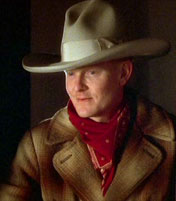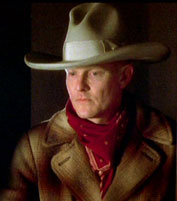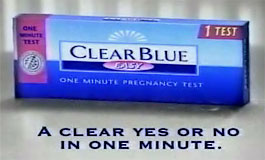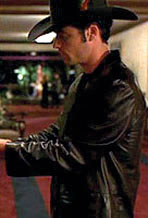Cowboy![]() LafayetteMontgomery
LafayetteMontgomery
|
Sex |
|
Male |
Quote: "A man's attitude
… a man's attitude goes some ways, |
|
Age |
Old as dirt |
||
|
Address |
Sunset Ranch, Beachwood St. |
||
|
Occupation |
Holding lectures |
||
|
Fashion style |
Western |
||
|
Relationship |
Castigliane, Mr Roque, Jason, Coco |
||
|
Doppelganger |
Diane, Herb, Brooker? |
 Adam's
tormentor
Adam's
tormentor
I tend to think that the Cowboy assumes the role that he does in the first 2 hours of Mulholland Drive as a result of Diane's experiences at the party in the second half of the film. At that party, 3 important events occur in this respect: Adam speaks of his separation from his wife, we see that Adam is now with Camilla and on the brink of announcing their engagement, and we also spot the Cowboy as another guest at this party.
It is my guess
that it is this chain of events which makes Diane associate her negative
feelings towards Adam (having taken Camilla away from her) with the shadowy
figure of the Cowboy, and turn him into Adam's fantastical tormentor during
the first two hours of the film. In a certain light, the mayhem visited upon
Adam by the Cowboy and his ex-wife during the first 2 hours of Mulholland
Drive can be seen as Diane's revenge fantasy against him.
In terms of David
Lynch's body of work, the character of the Cowboy in Mulholland Drive is
somewhat reminiscent of the Mystery Man in Lost Highway, who is a similarly
misleading and menacing character (both for the audience and one of the film's
antagonists).
- (Vanessa Long)
Why did we see the Cowboy twice?
The Cowboy tells Adam to pick the right girl, remarking "You will see me one more time if you do good. You will see me two more times if you do bad."
-
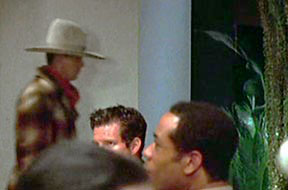 The Cowboy appears in the director's
house during the party at the end of the movie (flashback). Diane sees him
out of the corner of her
eye right after the blond girl walks out. While he doesn't fit into the party scene she
invents a
fictional construct in her mind to explain the reason he showed up for. In
Diane's dream he turns into that girl's patron, strong-arming Adam to cast her into the "Sylvia North Story".
The Cowboy appears in the director's
house during the party at the end of the movie (flashback). Diane sees him
out of the corner of her
eye right after the blond girl walks out. While he doesn't fit into the party scene she
invents a
fictional construct in her mind to explain the reason he showed up for. In
Diane's dream he turns into that girl's patron, strong-arming Adam to cast her into the "Sylvia North Story".
To us, caught up in the backward dream logic of Diane's fantasy, this would have been the one last time the director would see the Cowboy, since he agreed to cooperate. -
To Diane the Cowboy appears one more time - as a transition from her dream back to reality, which apparently happens after the dinner party. Diane's subconscious is telling her that she personally did wrong. She had a choice and if she had chosen more wisely (becoming the person she used to be), we wouldn't have seen the Cowboy this second time. But Diane lets the obsession take control, resulting in Camilla's and her own death. Hence the Cowboy's mournful expression when he closes the door.
Counting visits
I would suggest that there is a time lapse at the party where/when we see them (again) at the dessert course. The cowboy is on his way out. Certainly, he could have met with Adam during or between other courses. As he is in Adam's house, that would seem to be a visit in my book.
On that same rationale, if we don't give Adam credit for seeing the cowboy when the dude is in his house, we can't give credit for the woman on the bed for seeing the Cowboy when her back is to him.
As already mentioned, the words might not be for Adam but for another
character or the dreamer. This leaves many possibilities.
It is also how you choose to count. Is the cowboy coming into the Sierra Bonita bedroom one visit or two? I see it as two. This explains the shot up mattress in the second view and more importantly the decomposing body.
So, counting Adam's party does that now make three? or zero sightings? Do you choose to think of the Cowboy corral scene as part of the dream and the bedroom scenes with the cowboy as the end of the dream? That would make two more visits. The last one being him leaving the scene of the crime. One problem with this idea is that clearly with the body already decaying, she doesn't (literally) see him. As already mentioned, as we don't see the girl on the mattress see the Cowboy in his first visit to the bedroom either. We don't even know who she is...
Clear as mud ... right? - (ctyankee)
There is one point that could be added: Betty, Diane's dream persona is not present at the corral scene, so if the cowboy's pledge is made to Diane (as well as to Adam, to whom it surely must be), then it is made to her as the dreamer. So the woman/body on the bed doesn't have to see him in order for the pledge to be fulfilled, since Diane as the dreamer does. - (jro)
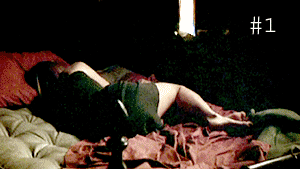 Wrong
girl in the room
Wrong
girl in the room
Yet, in a malevolent way, the Cowboy and his ominous partners are only doing what they think is in the best interests of Diane. The Cowboy explains that he believes Diane's sad life is the result of a sad attitude. Since Diane believes more in Camilla than in herself, Camilla is the one becoming the star. To them, the logical solution to this is to get rid of Camilla. In their view, if Camilla stays, then Diane is doomed.
The Cowboy's last statement about one or two more visits explains this when you look at what happens at the end of the fantasy: He enters Diane's room smiling, saying to the "Pretty Girl" in the bed that it is time to wake up. But it is not Diane in the bed, it is Rita/Camilla. In the Cowboy's logic this is bad. Or, more to the point, something bad happens because of it. Diane is still obsessed on Rita/Camilla because she is in her bed. The wrong woman is in the room, just as Louise Bonner had told us earlier. There are going to be terrible consequences because of this. The scene fades out, and then back in. The Cowboy is now appearing for the second time and he is no longer smiling. As he leaves the second time, we now see on the bed the image of the Diane Selwyn from the dream, and she is dead and the fantasy comes to an end. - (Alan Shaw)
Separate appearances in the doorway
|
|
|
|
1) Cowboy entering |
2) Cowboy leaving |
Now we can finally interpret the Cowboy's words to Adam about the significance of seeing him one more time or two more times. Of course, his words were meant for the Diane in her Adam persona, not for the real Adam, so like everything else in the fantasy, the words apply to Diane and not to Adam.
In this scene there is a strange fade to black that happens after we see the Cowboy one time. This means we are seeing him more than once if you count seeing him before and after a fade out as two times.
I interpret this as a manifestation of an abusive past that Diane tries to
repress: When the Cowboy, like the grandfather, saw Diane the first time in her bed, he saw her growing sexual persona and she was still whole and undamaged. But the second time he sees her, it is after the sexual abuse and it has left her destroyed. In one sense, the Cowboy is saying that if Diane's mind just remembers the first part of the her grandfather's visit to her bedroom, the sexual abuse can stay a repressed memory and she can continue to keep the innocent Betty persona and the Rita persona in an uncorrupted form. But if she remembers the entire incident, then her Betty and Rita personas will be destroyed by the misery and the corruption that followed that trauma. In the Cowboy's logic, remembering too much is the "bad" thing of which Diane is ultimately guilty.
-
(Alan Shaw)
Diane's father/abuser
I think the
figure of the Cowboy is pretty important in the movie and here is my theory:
The Cowboy, who appears only in Diane's dreams and hallucinations is her
father. She was molested by him as a young girl (very usual for Lynch) and
sees him as the most powerful person in her dream universe. I'm sure he was
the God (not a kind loving force, but an unstoppable juggernaut that owns her)
to the small child that he molested. At the same time he was her father. So
when she makes Adam go through what she went through, the scene at the corral
arises from her mind. The Cowboy acts as a fatherly figure to Adam and gives
him advice. At the same time, much like in an act of molestation, he completely
takes control of Adam's life.
Adam and the directors that Diane associates with him was probably the second
most influential force in Diane's unfortunate life. So to take control of Adam
she brings from her memory the most powerful person she's ever known, the
wicked father. His power enlarged through the eyes of a small child makes him
seem almost supernatural.
A good proof to this theory is Diane's awakening from her dream by The Cowboy
with a very creepy "Wake up, pretty girl." - (spetznaz)
Related: The Cowboy representing the abuser
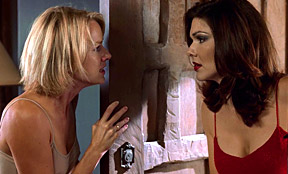 Camilla
in the doorway/Cowboy in the doorway
Camilla
in the doorway/Cowboy in the doorway
Camilla may actually be sympathetic and really wants to help Diane when Diane's rejected her and expelled her from her sanctuary. Maybe Camilla wants to warn Diane about something but Diane won't listen… until the Cowboy appears. There's the visual/symbolic connection there between the last vision of the Cowboy before Diane awakens and when she sees Camilla one last time, the sound of an opening door precedes the image of the Cowboy and Camilla standing in the door way… the Cowboy lets himself in and out, Diane pushes Camilla out as she's trying to stay in. Opposing forces, Diane's mind going out of whack, fantasy mixing with reality… - (civilsavage)
Innate authority
I feel the role
of the Cowboy has been widely misunderstood. He appears somewhat sinister, but
this is because he represents an empowered and awesome archetype within
Diane's personality. He has an innate authority. His conversation with Adam is
her internal dialogue. He proclaims simple, profound truth: "Attitude
Determines the Course of Life". He makes Diane (as Adam) repeat this
lesson, but she cannot grasp the significance. Then he tells her to submit to
destiny, to detach from petty worldly ambitions and desires - to let the other
girl get the role – and to ride his buggy through life, and beyond, with him
as driver and guide.
His reference to the 'buggy, and there being only one driver', can be
understood by the mystical idea of harnessing the lower, untamed, animal Self
to the enlightened higher spiritual Self, and permitting that aspect of one’s
being to dictate the course of life. Lynch has had a longtime interest in
Eastern thought and meditation, and these concepts are familiar to someone
with those inclinations. - (sinbad555)
The corral speech
The Cowboy's words to Adam, about a buggy and the one that is driving it, refer to the concept of fate reminiscent of the Greek stoicism. This school of philosophy advocates absolute determinism and employed such example as the following:
"That just as a dog, supposing him attached to a car, if indeed he is disposed to follow, both is drawn, or follows voluntarily, making an exercise also of free power, in combination with necessity, that is, fate; but if he may not be disposed to follow, he will altogether be coerced to do so."
And the same, of course, holds good in the case of men. Stoics
would say, the free will of a man consists in his attitude towards
what is inevitably to happen. The task of the wise man is to realize nature (and
hence fate) and to align himself in order to be happy. Rebellion only leads
to distress.
I believe this to be the film's central message. Kesher starts a fight with the movie executives who
may destroy him. But the destruction is of cosmic nature. Despite his
resistance, Kesher's existence dissolves at fast pace. He is expelled from home,
he wanders about places, that, in fact, do not provide refuge. He must accept his destiny
in order to go on with his life. And this is exactly what happens in the second
part - Adam's biography is rewritten and now he is a successful filmmaker
going to marry Camilla.
The Cowboy stands for fate that drives the buggy of life. He is clinical and, by his absurd appearance, a character of no specific qualities (fate is faceless) – unlike the bum behind Winkies, who is the devil and god at the same time. Together they present the execution of fate. - (Frank Wittchow)
Related Theory: Fate and Reincarnation
Supernatural entity
During the dream sequence, the Cowboy appears at the corral to Adam amidst electricity surges. In earlier Lynch works, this was used to show the presence of something supernatural. The Cowboy seems to be the antithesis of the DARK MAN or the MONSTER MAN. If he were some sort of supernatural guide, it makes sense that he wakes up Diane at the end of her dream. Because basically, the end of Diane's dream is the end of her life. - (jonviglione)
Evidence of the Cowboy's "godliness" - (guystr09)
1. Adam must go to the top of the mountain to see him. He goes because he is told that the Cowboy is the one that has the control over his fortunes.
2. When the Cowboy arrives, the light comes on ("Let There Be
Light"), when he leaves, darkness
comes.
3. He speaks to Adam in parables about moral choices.
4. He tells Adam that there are consequences for doing wrong ("bad")
and rewards for doing right ("good").
5. Adam listens, obeys and is saved (gets to produce his movie).
6. He is talking to ADAM, for crying out loud.
And speaking of oddness. I thought for one moment that the Cowboy was an angel and brought "Betty/Diane" back to life at the whim of the cosmic string pullers. - (Ralph Wiggum)
Related Theory: A reordered sequence
Pregnancy test?
There are "Diane is pregnant" theorists among us. Couple of points of evidence; two conversations that Diane/Betty have with Coco, two specific lines of dialogue:
Coco: "If there is trouble in there, get rid of it!"
Diane: "I'm sorry I was late..."
|
|
|
Pregnancy test commercial clip by David Lynch |
And an odd connection between Coco's advice to get rid of trouble and what Louise Bonner says to Coco: "That one is in my room and she won't leave. I want you to get her out. I want you to get her out now."
If Diane is pregnant - and this could possibly relate to the sexual abuse theory - then this would be one of the things weighing heavily on her mind, and would manifest itself in the dream. My proposal was that The Cowboy could be related to a pregnancy testing kit. If you see two blue lines you are pregnant (you did bad), if you see one blue line you are not pregnant (you did good). Seems pretty far out, I know. But it kinda makes sense if you stop and think about it for a minute... - (blu-riven)
Link: Clear Blue Easy One Minute
About a series of ads Lynch was shooting for a home pregnancy test in 1997
(associated
advert clip 1 MB)
Related: The Abortion Theory
Interesting trivia facts about some Cowboys and 6980 - (richdubbya)
-
The Cowboy in MD is generally thought to be patterned after cowboy stars Tom Mix and William Hart. Wyatt Earp lived in Los Angeles the last few years of his life and was a consultant on cowboy/outlaw themes on western films. He was friends with famous silent cowboy film stars Tom Mix and William Hart who were pawl bearers at his funeral.
-
Isabella Rossellini (past fiancée of David Lynch) and Bill Pullman (Lost Highway) were in the 1994 movie Wyatt Earp.
-
Wyatt spent time at the Sierra Bonita Ranch in Arizona owned by his friend and fellow cowboy hall of fame member "Col. John Hooker".
The Sierra Bonita ranch provided meat to the US army. -
The term "hooker" as used to describe a prostitute comes from a civil war General Hooker who provided prostitutes for his men.
-
Wyatt Earp ran several brothels during his lifetime, as did his ex prostitute common law wife.
-
Sunset peak in Arizona overlooks the Sierra Bonita ranch and has an altitude of exactly 6980 feet.
-
Blake Edward’s film noir set in Hollywood, "Sunset" contains a fictional account of the meeting of Wyatt Earp and Tom Mix.
-
In 1940 near Tucson Az, and within miles of the Sierra Bonita ranch and Sunset peak Tom Mix was killed in a car crash.
More Trivia
-
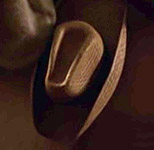 Coco
& Cowboy
connection: Notice that in the first part there is no foul language: "horse
pucky" and "smart
aleck" are spoken in place of "bull shit" and "smart ass."
Coco
& Cowboy
connection: Notice that in the first part there is no foul language: "horse
pucky" and "smart
aleck" are spoken in place of "bull shit" and "smart ass."
No dirty words in the dream sequence. Is this a reference to Hollywood in the 50's? - (Tom Blain)
»Aunt Ruth - the principal character? -
In the first lesbian scene between Rita & Betty right before Rita takes off her towel, she takes off her wig then "fixes" her hair. Above the mirror, Aunt Ruth has a collection of hats - one of which is a cowboy hat.
The cowboy also appears to Diane, when he enters her bedroom to wake her. With this final exit from the fantasy world of Diane, we see that the Cowboy seems to be familiar with going into and out of Diane's bedroom. We have to consider the idea that if this issue has come up two times, then he may be yet another person who should be thought of as one of Diane's Johns. »Diane involved in call girl business? -
Lafayette Montgomery, who plays the Cowboy in the first part, is not an actor but a film producer and good friend of David Lynch. He co-produced Lynch's "Wild at Heart" (1990) and "Twin Peaks" (1990-91).
-
The Cowboy at the dinner party is played by a different, uncredited actor. »screenshot from the Making Of
|
|
References? Did anyone notice that in 1988 Lynch did an episode of a mini-series called "Las Francais vus Par" ("The Cowboy and the Frenchman") where a Frenchman and a cowboy meet by a corral? I mention this because in Mulholland Drive, there's likewise a scene where Justin Theroux (who is, at least by name, French) goes and meets a Cowboy at a corral. - (Iechium) Coincidentally, in 1997, Justin Theroux had a very small part in a movie called 'Romy and Michele's High School Reunion'. In it he was a mysterious stranger, dressed all in black and wearing a cowboy outfit. In the credits he's listed as 'The Cowboy'. From a review: He emerges from pitch-dark shadows, stands in the spotlight, gazes into Janeane Garofalo's eyes and says, "You're right, I was a brain-dead redneck asshole." |
|
|
"The Cowboy and the Frenchman" |
Theroux as "The Cowboy" |
|
Threads:
The Cowboy??
- (daris) |
Related: |
